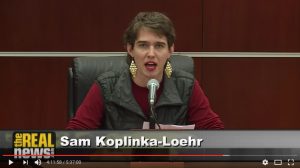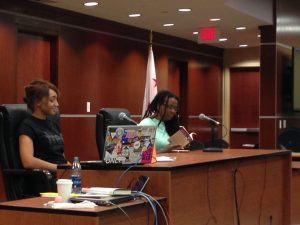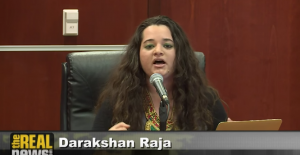
Sam Koplinka-Loehr, NWTRCC Field Organizer, testified at the Iraq Tribunal on Friday, December 2nd about the costs of the war. Their testimony is below.
By Sam Koplinka-Loehr
(content warning: suicide)
Wow. I am still reeling from being at the People’s Tribunal on the Iraq War last Friday, December 2nd in Washington, DC. The Tribunal focused on the lies and costs of the Iraq War. At the end of the day of testimony, I was inspired and heartbroken. My mind raced, and I had a headache. I felt both energized and tired to my core.
Upon walking into the courtroom Friday morning, the love and community spirit was palpable. I was greeted with open arms by Kevin Zeese and Margaret Flowers with Popular Resistance, a great source for movement news. I had just joined the two of them on air a few days earlier to talk about war tax resistance as well as the tribunal. You can listen to the entire radio show online here. Ciara Taylor with CODEPINK and one of the co-founders of Dream Defenders then gave me a big hug and welcomed me to the space.

Ciara Taylor (left) moderates the Tribunal while Esther Iverem (right) reads poems about the military, police, and violence from her book.
The feeling of mutual support and care for each other was critical, because each speaker’s words hit hard. Julio Torres with Iraq Veterans Against The War talked about the deep sense of betrayal from serving in the military, and holding onto the pain and suffering until you are “playing a game of chicken with your whole life.” Stacy Bannerman then testified on how that pain lands on the loved ones of veterans, through physical and emotional abuse.
Soon I was in tears, and am crying as I write this, hearing Kevin Lucey testify about walking into his basement to see his son Jeffrey, an Iraq War veteran hanging from his neck by their garden hose. Kevin said he lowered Jeffrey down to the ground and held his son’s lifeless body in his arms. With each person’s testimony, the weight became heavier. As it should be. For many of us have been too numb for too long

Darakshan Raja, Washington Peace Center, speaks during the Iraq Tribunal Press Conference.
During lunchtime, there was a press conference where organizers from around the world delivered a clear message, that our movements must become stronger and work together like never before. Darakshan Raja, the director of the Washington Peace Center, ended her testimony by saying, “we are far more than just weeping crying victims. We are also survivors, we’re also thrivers, we are also warriors. It is really imperative and key that this movement, in order to really be a movement, starts really shifting the way it has shown up.” Darakshan demanded that people impacted by state violence, particularly people of color, are central to decision-making and shaping campaigns for justice rather than tokenized and exploited.
I testified in the afternoon, giving a personal account of resistance to the Iraq War. I spoke about going to mass protests against the war, as well as refusing to pay income taxes. Here is a section from my testimony. (You can read my entire testimony here.)
Come back with me to sixth grade, a few months before the U.S. invasion of Iraq. There is frost on the windows of our maroon minivan. We are packed in tight, legs pressed together as we drive down to Washington, DC for the protest. We pile out of the car, and join the hundreds of thousands of other people in the streets. Feet pound the pavement, mile after mile. Chants shouted at the top of our lungs. Mom, are we done yet? I ask. Can we go home? Has Bush heard us yet?
The police rise up like a wall, telling us you can’t go this way, stay on the highlighted route. Our discontent corralled. Let them protest, just don’t go near the president. Let them protest, as long as they keep paying their taxes. Let them protest, as long as they don’t stop the planes from taking off.
It is Saint Patrick’s Day, 2003. Days before we are set to invade Iraq. I hear that our family friends have been arrested. They entered a military recruiting office and spread their blood in protest. There is blood on the American Flag and our friends are in prison.
As the Tribunal came to a close, I was left with a number of questions. How do we heal? Which is perhaps an impossible question. Maybe more realistically, how can we build more community power in an intersectional anti-war movement? And what lessons do we need to learn from our failed organizing efforts to stop the Iraq War? One of the primary demands of the Tribunal was for President Obama to create a Commission on Truth & Accountability on the Iraq War before leaving office. While this is a good step, I think our true power lies with each other. It is clear we need to be building stronger relationships between our movements to ensure that we can work together in new and innovative ways going forward.
Before leaving, I spoke with a number of folks who helped organize the Tribunal about war tax resisters’ new initiative this year, planning to collectively redistribute tax money to black-led organizing for liberation. They were excited about it, especially as a way forward to build stronger relationships and collaboration between our organizations and movements. This is just one piece, but hopefully one piece that is part of a much bigger effort to build our movements stronger than we can even currently imagine.





Very moving. Thanks Sam for being part of this gathering, for sharing your experience, listening, and connecting.